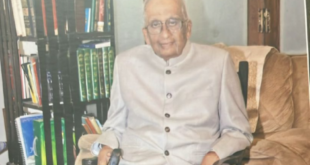After losing a record 15 votes in the House of Commons in his first hundred days as the prime minister, and at the fourth attempt (the first was on 4 September) for the 16th vote, British Prime Minister Boris Johnson, tasted victory for the first time, but in reality a face saving action allowing him to call an early general election. The vote finally killed the possibility of Britain leaving the EU on 31 October, a resolve repeated perhaps a thousand times over in hundred days by the prime minister.
Coupled with his Commons victory, Boris suffered another blow to his resolve to leave the EU on 31 October, after losing yet another vote in the parliament and instead forced to request a postponement from the EU, seeking a delay beyond Britain’s scheduled departure, a request which was promptly agreed to by the EU, in contrast to its earlier swashbuckling saying it will not agree to any such request.
This should be seen as a victory for the British public and democracy. As since the Brexit referendum results were out on 23 June 2016, the British public realised that they were fed completely misleading information regarding the political establishment’s wish to leave the UK. Since then with the change of prime ministers and tomes of lies being fed to them, they were clamouring for an election or yet another referendum. Ultimately the peoples voice won and now the UK will have the next general elections in December 2019.
Now Boris is obliged to hold the general elections, and this will restore functionality to the Parliament. The House voted overwhelmingly for a general election on 12 December: out of a total of 650 MPs, 438 voted for, 20 against. Most abstentions were from Labour MPs who have issues with Corbyn’s leadership.
Both Conservative and Labour parties have begun emergency candidate selection. Conservatives are thought to be holding back safe seat selections until the week of 11 November.
The extension granted by the EU till 31 January 2020, which Boris was forced to accept, is flexible, which means that if Johnson secures the desired majority of 60-70, technically the UK could exit the EU before Christmas.
The Labour leader, Jeremy Corbyn immediately launched an aggressive Labour Campaign announcing, “The most ambitious and radical campaign for real change our country has ever seen”.
Conservatives are believed to have held on to more 2017 voters than the opposition, but tactical voting is going to have the biggest influence on the election result—combined opposition party voters are likely to vote to stop a Conservative win.
At this moment in time it is thought neither Labour nor LibDem can secure a majority. But they are working together tactically to avoid a Tory majority. A hung Parliament is not only a risk for the Conservatives but for Britain.
The unprecedented fragmentation of politics is one big reason the 2019 election is so hard to predict. The national result will depend on very different sets of contests being fought across the UK.
First, as in 2017, a central plank of the Conservative strategy is winning over a number of traditional Labour seats that voted heavily for Brexit. Much will depend on whether enthusiasm for Brexit and antipathy towards Jeremy Corbyn will prove sufficient to overcome generations of anti-Tory sentiment in such seats.
Secondly, while the Conservatives will be looking to advance in Leave territory, Labour and the Liberal Democrats will seek gains on the Tory Remain flank. The most vulnerable part of this fringe is seats the party is defending from the Liberal Democrats – a Lib Dem vote is more attractive than a Labour one to Tory Remainers on both Brexit and domestic-politics grounds.
Thirdly, there are also many seats in Remainia where the Conservatives will be fending off a Labour challenge. While direct Conservative-to-Labour switching may seem less likely, plenty of it happened in the last election, and many of these formerly safe seats are now much more vulnerable. Labour can gain more from a small swing in Remain seats than the Conservatives can gain from a small swing in Leave seats.
Fourthly, much of the Remain vote is densely packed into Labour-held city-centre and university seats that support EU membership by landslide margins. The Liberal Democrats will hope to exploit their surging support with Remainers in these Remain bastions, exploiting disappointment with Labour to open up a second front.
Fifthly, in Scotland, most Scottish seats would change hands on a small swing, virtually none are safe, and many are three- or even four-horse races. The Conservatives face a tough battle to hold on to their 2017 gains against a resurgent Scottish Nationalist party, while the Liberal Democrats will hope for gains too, given Scotland’s strong Remain lean.
Lastly, the other smaller nations of the UK will also be hotly contested. Labour support has slumped in Wales, opening up opportunities for the Conservatives, the Liberal Democrats and Plaid Cymru. Tactical alliances between Remain or Leave parties could prove crucial here in chaotic four- or five-party contests. Northern Irish polling suggests the DUP and Sinn Féin could find it hard to repeat their 2017 clean sweep. This could have crucial implications for the Westminster balance of power if DUP MPs are replaced by others less sympathetic to the Conservatives or Brexit, or if Sinn Féin MPs who never take their seats in parliament are replaced by pro-Remain MPs who will take seat in the parliament.
—-
 Gawah (The Witness) – Hyderabad India Fearless By Birth, Pristine by Choice – First National Urdu Weekly From South India – Latest News, Breaking News, Special Stories, Interviews, Islamic, World, India, National News
Gawah (The Witness) – Hyderabad India Fearless By Birth, Pristine by Choice – First National Urdu Weekly From South India – Latest News, Breaking News, Special Stories, Interviews, Islamic, World, India, National News





